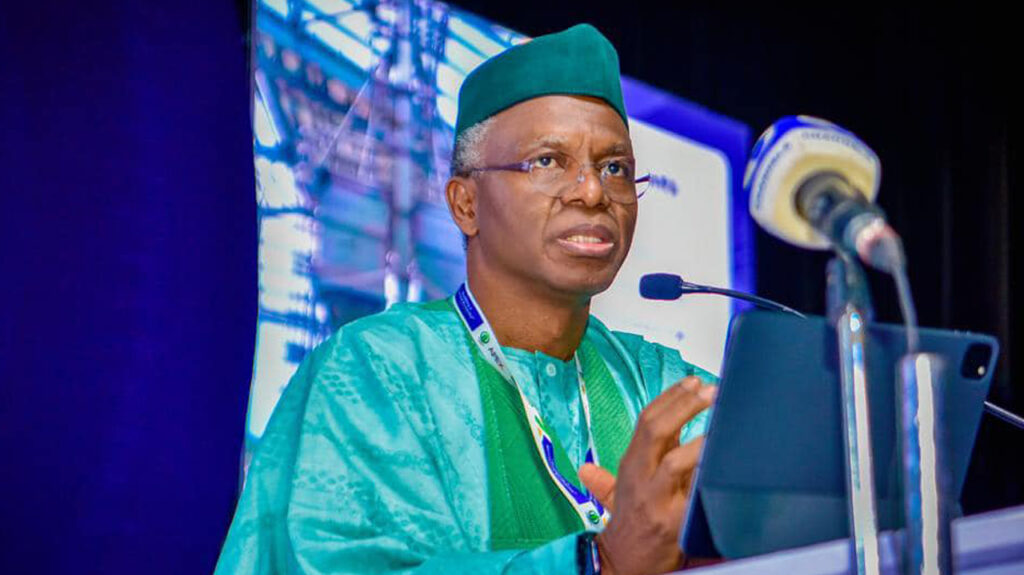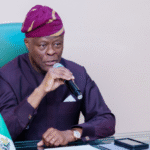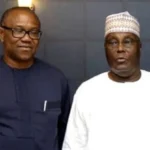The former Kaduna State Governor, Nasir El-Rufai, has alleged widespread corruption in the Nigerian judiciary, saying many judges and lawyers are corrupt.
Speaking on Monday at the Law Week of the Nigerian Bar Association (NBA), Bwari Branch in Abuja, Mr El-Rufai said the judiciary is no longer trusted by the public due to delayed justice and biased rulings.
A text of the former governor’s speech was shared with PREMIUM TIMES.
The former governor, who holds a Law degree from the University of London, claimed that justice in Nigeria often favours the rich and powerful.
He also criticised the use of ‘ex parte’ orders in political matters and accused some lawyers of using the courts for political gains.
He called on legal professionals to reflect on their roles and ensure justice is truly served without bias or influence from the executive arm of government.
“In parallel, our judiciary—meant to be the bedrock of fairness and order—is under intense scrutiny. Concerns about delayed justice, procedural inefficiencies, and in some cases, judicial compromise (to put the matter delicately), erode public confidence. The rise in “forum shopping,” the weaponisation of ex parte orders in political matters, and the growing perception that justice is for sale and available only to the rich and the powerful would cause the perceptive observer to conclude that what Nigerian Courts do is the administration of law and not the administration of justice.
“In Nigeria, there is a seemingly unbridgeable gulf between law and justice. Not only is justice wanting but the law that is administered seems to be according to the wishes of the Executive. The demand on you, as practitioners in the Temple of Justice, is a sober introspection as you contemplate whether indeed Justitia is blind and whether she holds the scales of justice in fine balance.”
Several surveys, including the one by Transparency International and its affiliates, have shown that the judiciary is one of the least trusted institutions in Nigeria.
Mr El-Rufai is also not the first former public official to accuse the judiciary of corruption. Several others, including retired Supreme Court judges, have made similar allegations in the past.
Judicial Corruption is Mainstream
The former governor argued that the corruption in Nigeria’s judiciary is now mainstream, noting that the widespread corruption in the system has led many Nigerians to lose respect for judges.
He criticised the National Judicial Council (NJC), for failing in its core mandate of disciplinary oversight, citing inconsistent judgments, opaque judicial appointments, and minimal consequences for erring judges as key factors contributing to the judiciary’s loss of integrity.
“If we must be honest, we must admit that the perception of a high level of judicial corruption is now mainstream. This is not helped by the opacity of judicial appointments, inconsistent rulings on electoral matters, the inexplicable delays in critical judgments and the slap on the wrists meted to notoriously bad Judges by the National Judicial Council which, I would respectfully say, has not succeeded in its mission and is now itself desperately in need of reform and restructuring.
“Once upon a time, ordinary citizens tiptoed past the homes of Judges. Not any longer. Now, judges are abused and maligned with almost reckless abandon. They are physically and mentally assaulted, sometimes roundly disrespected by the ordinary citizenry. How indeed are the mighty fallen,” he added.
While acknowledging the pressures and poor conditions under which many judicial officers operate, Mr El-Rufai noted that the problem is not solely about individual misconduct but also about weak institutions and a lack of visionary leadership within the legal profession itself.
He urged lawyers to hold both the Bar and the Bench accountable.
“But we must also resist simplistic narratives. Practically all judicial officers work under immense pressure, while being poorly resourced and poorly protected. The problem is not merely one of bad actors—it is also one of weak institutions and, dare I say it here, a lack of courageous leadership within the Bar. If the judiciary is to regain its moral authority, lawyers must lead the way there. We must speak out—not only when the Bench errs but also when the Bar fails. After all, every member of the Bench was once a member of the Bar.
“We must support judicial independence while demanding judicial accountability. We must advocate for reforms to the National Judicial Council, to the funding mechanisms of the judiciary. We must insist and ensure that the criteria for elevation to the Bench and the appellate courts must be raised and made devoid of even the slightest hint of opacity. Also, the discipline of erring judicial officers must be very firmly and strictly enforced. Recent comments on this issue by Vice President Prof Yemi Osinbajo SAN bear witness to the gravity of the situation.”
Critique of emergency rule in Rivers State
Mr El-Rufai condemned the state of emergency in Rivers State, warning that such a move could set a dangerous precedent and violate constitutional provisions.
He cited the decisions of the Uwais-led Supreme Court (2006–2007), which limited presidential powers during states of emergency, particularly in reversing the impeachments of former governors Joshua Dariye of Plateau State and Peter Obi of Anambra State.
“The Uwais-led Supreme Court between 2006 and 2007 discharged this responsibility by reversing the impeachment of Governors Joshua Dariye and Peter Obi and severely restricting the powers of the President when a ‘state of emergency’ is lawfully declared in any state of the Federation,” he said.
The former governor also questioned the legitimacy of the voice vote method used by the National Assembly to approve the emergency rule, arguing that the constitution explicitly requires a two-thirds majority vote of all members of each legislative chamber.
“All eyes are now on the Kekere-Ekun court on the action of the current president to remove elected executives and legislators due to the declaration of a state of emergency. Many informed Nigerians are also curious to know whether two-thirds of all the members of the National Assembly can be decided without a division and physical count – but through voice votes as the Akpabio and Abbas-led chambers did with such arrogant disregard for common sense.”
PREMIUM TIMES reports that the two chambers of the Nigerian National Assembly used voice votes to approve President Bola Tinubu’s State of Emergency in Rivers State despite a constitutional provision that mandates a two-thirds majority vote by each chamber for such approval.
Section 305 (6b) of the Nigerian constitution mandates that a state of emergency in any part of Nigeria proclaimed by the president must be supported by a “two-thirds majority of all the members of each House of the National Assembly.”
However, instead of conducting an official roll-call vote in which each lawmaker’s stance is recorded, both chambers of the National Assembly adopted a voice vote, a method where lawmakers simply shout “aye” or “nay,” and the presiding officer subjectively determines which side has the majority
Advice to the Bar
Mr El-Rufai urged the leadership of the NBA to look inward and desist from mediocrity and malpractice.
“Permit me, also, to say something that may be uncomfortable but necessary. The NBA must look in the mirror. We cannot demand integrity in public life while tolerating mediocrity or malpractice within our own ranks. We cannot lament the erosion of justice if we allow our own internal regulatory and disciplinary bodies to be toothless. We cannot continue to demand a clean electoral process while profiting regularly from the shenanigans that have infected election petitions.
READ ALSO: Nigerians percieve judiciary as corrupt, inaccessible Report
“In Chief Gani Fawehinmi v. Nigerian Bar Association (No.2) (1989) 2 NWLR (Pt. 105) 558, the Supreme Court highlighted the responsibility of the NBA in maintaining professional ethics: “The NBA must ensure that its members adhere to the highest standards of professional conduct to maintain public confidence in the legal profession.” It is time to renew the moral foundations of our Association—not through slogans, but through structure and deliberate and well-considered action.”
The former governor encouraged the lawyer’s association to invest in long-term reforms, such as strengthening ethical codes, revitalising continuing legal education, promoting a strong pro bono culture, and ensuring internal democracy within its leadership structures.
“Let us revisit our ethical codes, our continuing legal education programs, our pro bono culture, and our internal democracy. Let us invest not just in the glamour of conferences but in the grit of reform. Let us not be a profession that is feared but not respected, visible but not trusted, numerous but not impactful. May it not be too late,” he said.
Support PREMIUM TIMES’ journalism of integrity and credibility
At Premium Times, we firmly believe in the importance of high-quality journalism. Recognizing that not everyone can afford costly news subscriptions, we are dedicated to delivering meticulously researched, fact-checked news that remains freely accessible to all.
Whether you turn to Premium Times for daily updates, in-depth investigations into pressing national issues, or entertaining trending stories, we value your readership.
It’s essential to acknowledge that news production incurs expenses, and we take pride in never placing our stories behind a prohibitive paywall.
Would you consider supporting us with a modest contribution on a monthly basis to help maintain our commitment to free, accessible news?
TEXT AD: Call Willie – +2348098788999





